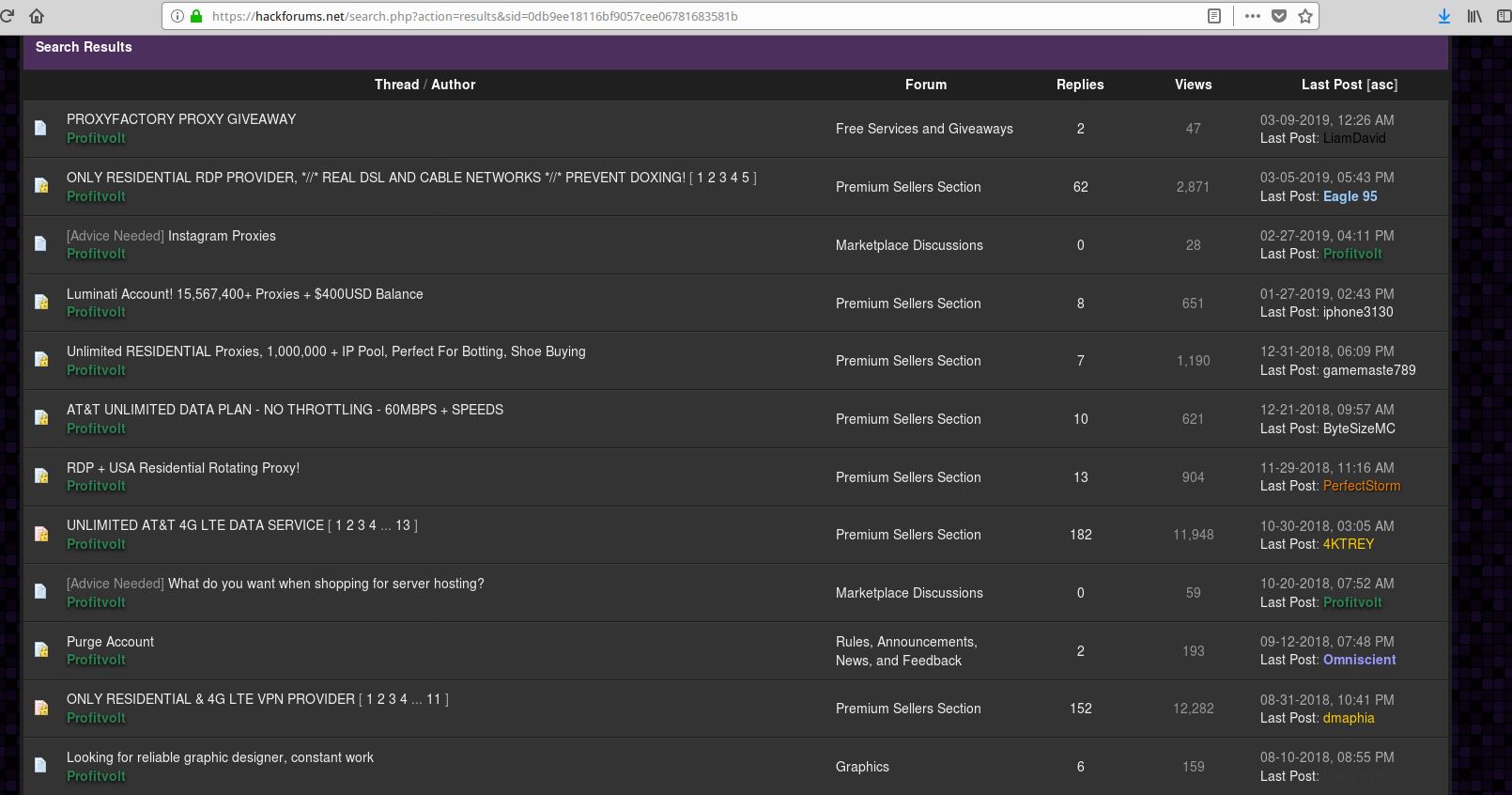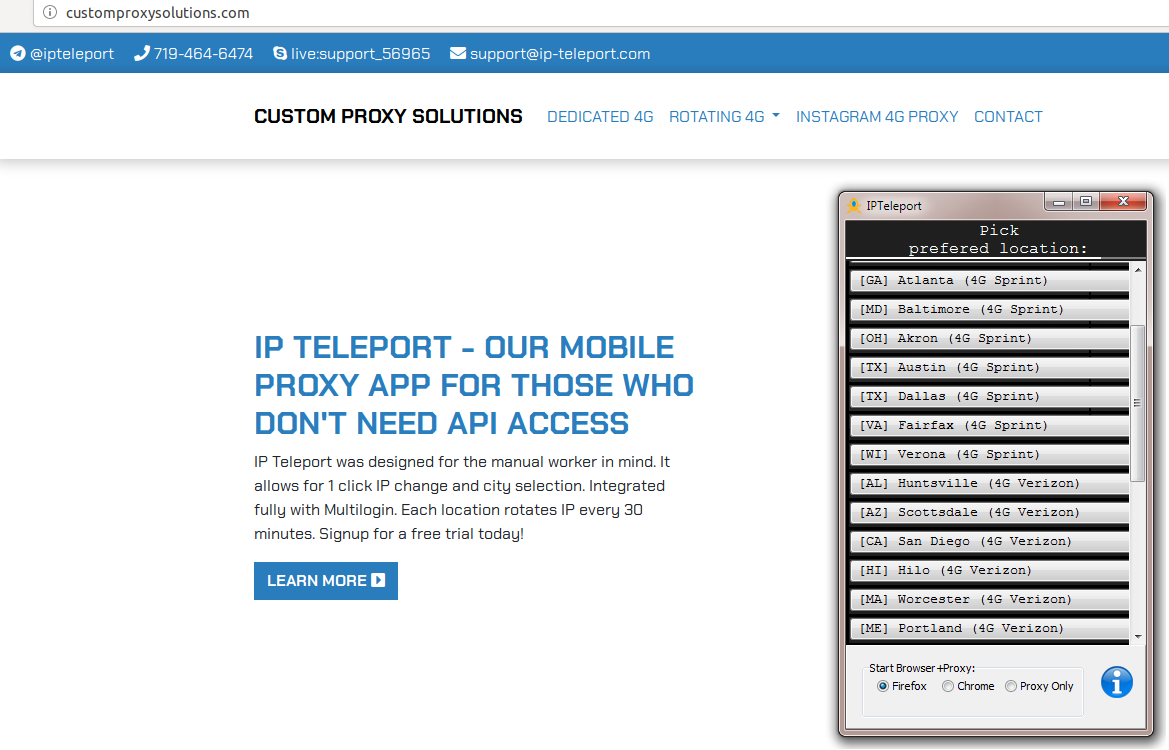The Rise of “Bulletproof” Residential Networks
Cybercrooks increasingly are anonymizing their malicious traffic by routing it through residential broadband and wireless data connections. Traditionally, those connections have been mainly hacked computers, mobile phones, or home routers. But this story is about so-called “bulletproof residential VPN services” that appear to be built by purchasing or otherwise acquiring discrete chunks of Internet addresses from some of the world’s largest ISPs and mobile data providers.
In late April 2019, KrebsOnSecurity received a tip from an online retailer who’d seen an unusual number of suspicious transactions originating from a series of Internet addresses assigned to a relatively new Internet provider based in Maryland called Residential Networking Solutions LLC.
Now, this in itself isn’t unusual; virtually every provider has the occasional customers who abuse their access for fraudulent purposes. But upon closer inspection, several factors caused me to look more carefully at this company, also known as “Resnet.”
An examination of the IP address ranges assigned to Resnet shows that it maintains an impressive stable of IP blocks — totaling almost 70,000 IPv4 addresses — many of which had until quite recently been assigned to someone else.
Most interestingly, about ten percent of those IPs — more than 7,000 of them — had until late 2018 been under the control of AT&T Mobility. Additionally, the WHOIS registration records for each of these mobile data blocks suggest Resnet has been somehow reselling data services for major mobile and broadband providers, including AT&T, Verizon, and Comcast Cable.
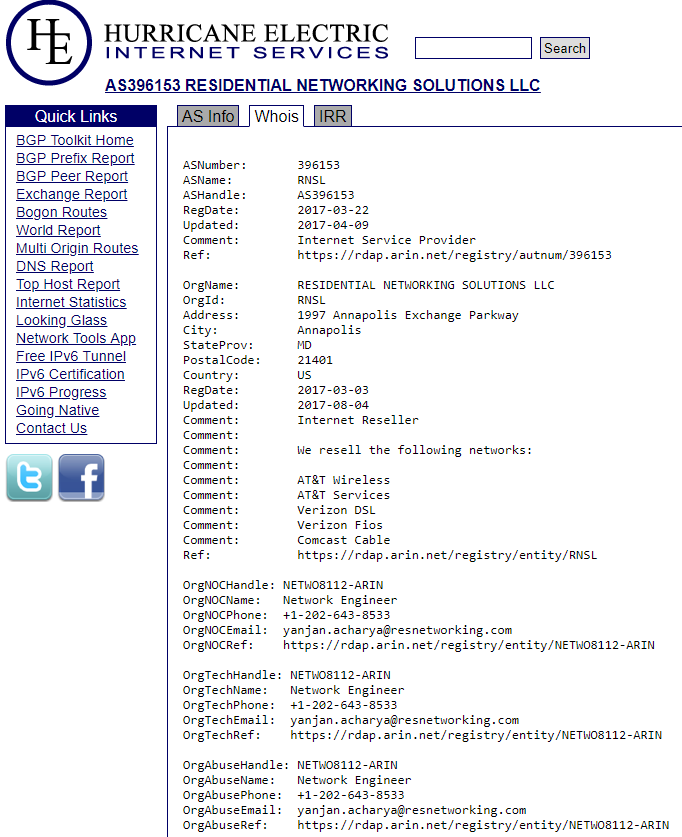
The WHOIS records for one of several networks associated with Residential Networking Solutions LLC.
Drilling down into the tracts of IPs assigned to Resnet’s core network indicates those 7,000+ mobile IP addresses under Resnet’s control were given the label “Service Provider Corporation” — mostly those beginning with IPs in the range 198.228.x.x.
An Internet search reveals this IP range is administered by the Wireless Data Service Provider Corporation (WDSPC), a non-profit formed in the 1990s to manage IP address ranges that could be handed out to various licensed mobile carriers in the United States.
Back when the WDSPC was first created, there were quite a few mobile wireless data companies. But today the vast majority of the IP space managed by the WDSPC is leased by AT&T Mobility and Verizon Wireless — which have gradually acquired most of their competing providers over the years.
A call to the WDSPC revealed the nonprofit hadn’t leased any new wireless data IP space in more than 10 years. That is, until the organization received a communication at the beginning of this year that it believed was from AT&T, which recommended Resnet as a customer who could occupy some of the company’s mobile data IP address blocks.
“I’m afraid we got duped,” said the person answering the phone at the WDSPC, while declining to elaborate on the precise nature of the alleged duping or the medium that was used to convey the recommendation.
AT&T declined to discuss its exact relationship with Resnet — or if indeed it ever had one to begin with. It responded to multiple questions about Resnet with a short statement that said, “We have taken steps to terminate this company’s services and have referred the matter to law enforcement.”
Why exactly AT&T would forward the matter to law enforcement remains unclear. But it’s not unheard of for hosting providers to forge certain documents in their quest for additional IP space, and anyone caught doing so via email, phone or fax could be charged with wire fraud, which is a federal offense that carries punishments of up to $500,000 in fines and as much as 20 years in prison.
WHAT IS RESNET?
The WHOIS registration records for Resnet’s main Web site, resnetworking[.]com, are hidden behind domain privacy protection. However, a cursory Internet search on that domain turned up plenty of references to it on Hackforums[.]net, a sprawling community that hosts a seemingly never-ending supply of up-and-coming hackers seeking affordable and anonymous ways to monetize various online moneymaking schemes.
One user in particular — a Hackforums member who goes by the nickname “Profitvolt” — has spent several years advertising resnetworking[.]com and a number of related sites and services, including “unlimited” AT&T 4G/LTE data services, and the immediate availability of more than 1 million residential IPs that he suggested were “perfect for botting, shoe buying.”
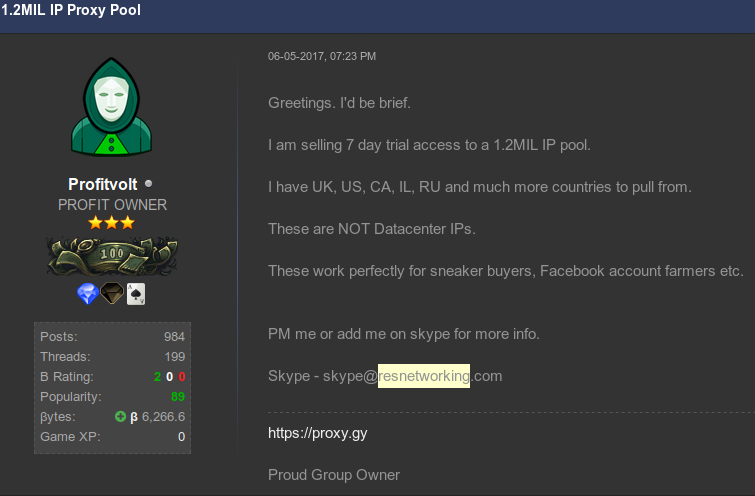
The Hackforums user “Profitvolt” advertising residential proxies.
Profitvolt advertises his mobile and residential data services as ideal for anyone who wishes to run “various bots,” or “advertising campaigns.” Those services are meant to provide anonymity when customers are doing things such as automating ad clicks on platforms like Google Adsense and Facebook; generating new PayPal accounts; sneaker bot activity; credential stuffing attacks; and different types of social media spam.
For readers unfamiliar with this term, “shoe botting” or “sneaker bots” refers to the use of automated bot programs and services that aid in the rapid acquisition of limited-release, highly sought-after designer shoes that can then be resold at a profit on secondary markets. All too often, it seems, the people who profit the most in this scheme are using multiple sets of compromised credentials from consumer accounts at online retailers, and/or stolen payment card data.
To say shoe botting has become a thorn in the side of online retailers and regular consumers alike would be a major understatement: A recent State of The Internet Security Report (PDF) from Akamai (an advertiser on this site) noted that such automated bot activity now accounts for almost half of the Internet bandwidth directed at online retailers. The prevalance of shoe botting also might help explain Footlocker‘s recent $100 million investment in goat.com, the largest secondary shoe resale market on the Web.
In other discussion threads, Profitvolt advertises he can rent out an “unlimited number” of so-called “residential proxies,” a term that describes home or mobile Internet connections that can be used to anonymously relay Internet traffic for a variety of dodgy deals.
From a ne’er-do-well’s perspective, the beauty of routing one’s traffic through residential IPs is that few online businesses will bother to block malicious or suspicious activity emanating from them.
That’s because in general the pool of IP addresses assigned to residential or mobile wireless connections cycles intermittently from one user to the next, meaning that blacklisting one residential IP for abuse or malicious activity may only serve to then block legitimate traffic (and e-commerce) from the next user who gets assigned that same IP.
A BULLETPROOF PLAN?
In one early post on Hackforums, Profitvolt laments the untimely demise of various “bulletproof” hosting providers over the years, from the Russian Business Network and Atrivo/Intercage, to McColo, 3FN and Troyak, among others.
All of these Internet providers had one thing in common: They specialized in cultivating customers who used their networks for nefarious purposes — from operating botnets and spamming to hosting malware. They were known as “bulletproof” because they generally ignored abuse complaints, or else blamed any reported abuse on a reseller of their services.
In that Hackforums post, Profitvolt bemoans that “mediums which we use to distribute [are] locking us out and making life unnecessarily hard.”
“It’s still sketchy, so I am not going all out to reveal my plans, but currently I am starting off with a 32 GB RAM server with a 1 GB unmetered up-link in a Caribbean country,” Profitvolt told forum members, while asking in different Hackforums posts whether there are any other users from the dual-island Caribbean nation of Trinidad and Tobago on the forum.
“To be quite honest, the purpose of this is to test how far we can stretch the leniency before someone starts asking questions, or we start receiving emails,” Profitvolt continued.
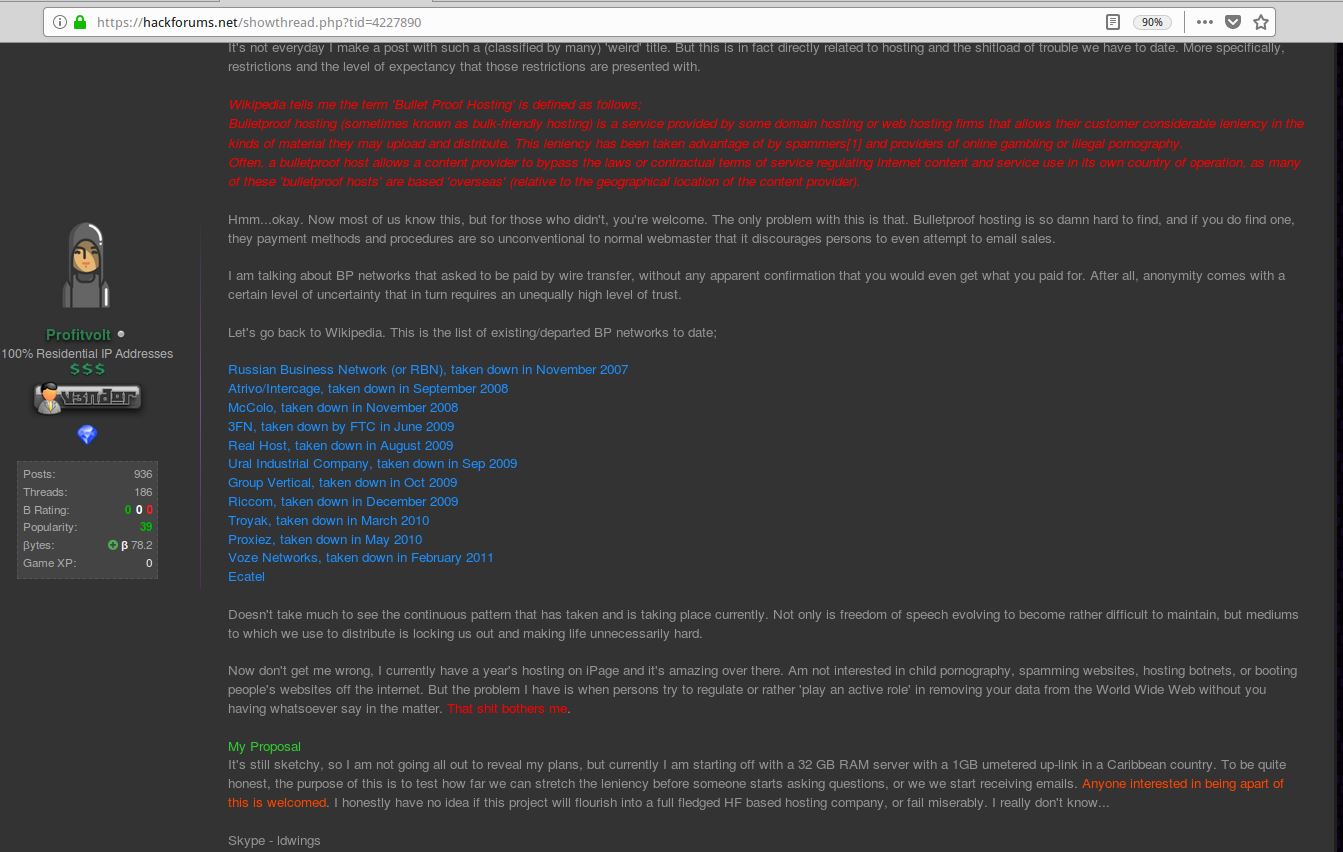
Hackforums user Profitvolt says he plans to build his own “bulletproof” hosting network catering to fellow forum users who might want to rent his services for a variety of dodgy activities.
KrebsOnSecurity started asking questions of Resnet after stumbling upon several indications that this company was enabling different types of online abuse in bite-sized monthly packages. The site resnetworking[.]com appears normal enough on the surface, but a review of the customer packages advertised on it suggests the company has courted a very specific type of client.
“No bullshit, just proxies,” reads one (now hidden or removed) area of the site’s shopping cart. Other promotions advertise the use of residential proxies to promote “growth services” on multiple social media platforms including Craigslist, Facebook, Google, Instagram, Spotify, Soundcloud and Twitter.
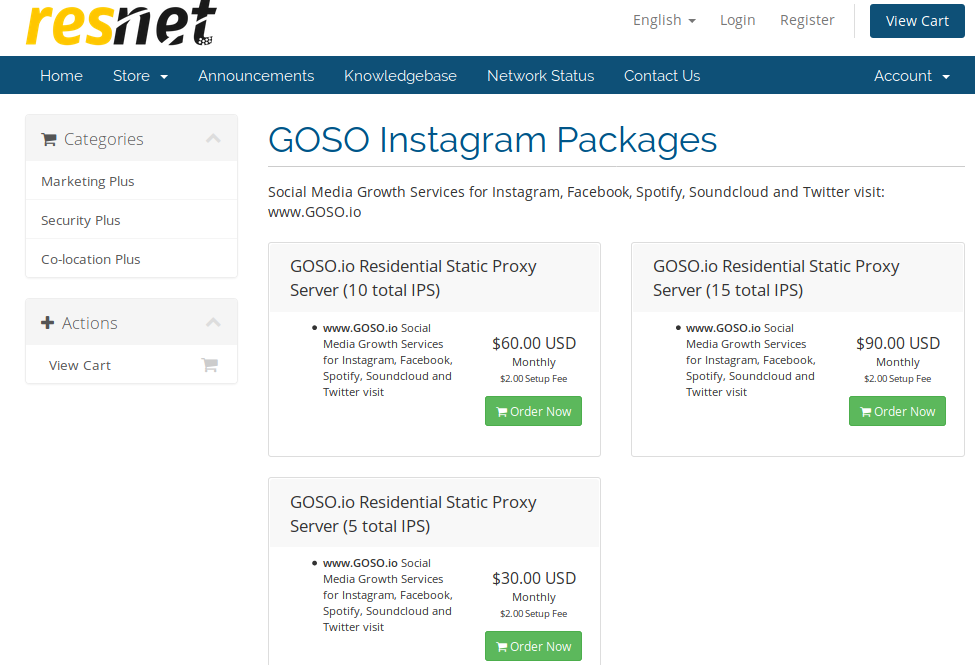
Resnet also peers with or partners with several other interesting organizations, including:
–residential-network[.]com, also known as “IAPS Security Services” (formerly intl-alliance[.]com), which advertises the sale of residential VPNs and mobile 4G/IPv6 proxies aimed at helping customers avoid being blocked while automating different types of activity, from mass-creating social media and email accounts to bulk message sending on platforms like WhatsApp and Facebook.

–Laksh Cybersecurity and Defense LLC, which maintains Hexproxy[.]com, another residential proxy service that largely courts customers involved in shoe botting.
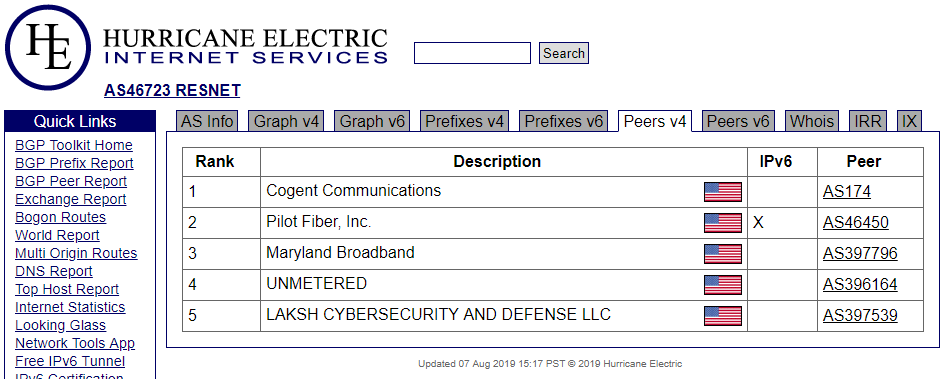
-Several chunks of IP space from a Russian provider variously known by the names “SERVERSGET” and “Men Danil Valentinovich,” which has been associated with numerous instances of hijacking vast swaths of IP addresses from other organizations quite recently.
WHO IS RESNET?
Resnetworking[.]com lists on its home page the contact phone number 202-643-8533. That number is tied to the registration records for several domains, including resnetworking[.]com, residentialvpn[.]info, and residentialvpn[.]org. All of those domains also have in their historic WHOIS records the name Joshua Powder and Residential Networking Solutions LLC.
Running a reverse WHOIS lookup via Domaintools.com on “Joshua Powder” turns up almost 60 domain names — most of them tied to the email address joshua.powder@gmail.com. Among those are resnetworking[.]info, resvpn[.]com/net/org/info, tobagospeaks[.]com, tthack[.]com and profitvolt[.]com. Recall that “Profitvolt” is the nickname of the Hackforums user advertising resnetworking[.]com.
The email address josh@tthack.com was used to register an account on the scammer-friendly site blackhatworld[.]com under the nickname “BulletProofWebHost.” Here’s a list of domains registered to this email address.
A search on the Joshua Powder and tthack email addresses at Hyas, a startup that specializes in combining data from a number of sources to provide attribution of cybercrime activity, further associates those to mafiacloud@gmail.com and to the phone number 868-360-9983, which is a mobile number assigned by Digicel Trinidad and Tobago Ltd. A full list of domains tied to that 868- number is here.
Hyas’s service also pointed to this post on the Facebook page of the Prince George’s County Economic Development Corporation in Maryland, which appears to include a 2017 photo of Mr. Powder posing with county officials.
‘A GLORIFIED SOLUTIONS PROVIDER’
Roughly three weeks ago, KrebsOnSecurity called the 202 number listed at the top of resnetworking[.]com. To my surprise, a man speaking in a lovely Caribbean-sounding accent answered the call and identified himself as Josh Powder. When I casually asked from where he’d acquired that accent, Powder said he was a native of New Jersey but allowed that he has family members who now live in Trinidad and Tobago.
Powder said Residential Networking Solutions LLC is “a normal co-location Internet provider” that has been in operation for about three years and employs some 65 people.
“You’re not the first person to call us about residential VPNs,” Powder said. “In the past, we did have clients that did host VPNs, but it’s something that’s been discontinued since 2017. All we are is a glorified solutions provider, and we broker and lease Internet lines from different companies.”
When asked about the various “botting” packages for sale on Resnetworking[.]com, Powder replied that the site hadn’t been updated in a while and that these were inactive offers that resulted from a now-discarded business model.
“When we started back in 2016, we were really inexperienced, and hired some SEO [search engine optimization] firms to do marketing,” he explained. “Eventually we realized that this was creating a shitstorm, because it started to make us look a specific way to certain people. So we had to really go through a process of remodeling. That process isn’t complete, and the entire web site is going to retire in about a week’s time.”
Powder maintains that his company does have a contract with AT&T to resell LTE and 4G data services, and that he has a similar arrangement with Sprint. He also suggested that one of the aforementioned companies which partnered with Resnet — IAPS Security Services — was responsible for much of the dodgy activity that previously brought his company abuse complaints and strange phone calls about VPN services.
“That guy reached out to us and he leased service from us and nearly got us into a lot of trouble,” Powder said. “He was doing a lot of illegal stuff, and I think there is an ongoing matter with him legally. That’s what has caused us to be more vigilant and really look at what we do and change it. It attracted too much nonsense.”
Interestingly, when one visits IAPS Security Services’ old domain — intl-alliance[.]com — it now forwards to resvpn[.]com, which is one of the domains registered to Joshua Powder.
Shortly after our conversation, the monthly packages I asked Powder about that were for sale on resnetworking[.]com disappeared from the site, or were hidden behind a login. Also, Resnet’s IPv6 prefixes (a la IAPS Security Services) were removed from the company’s list of addresses. At the same time, a large number of Profitvolt’s posts prior to 2018 were deleted from Hackforums.
EPILOGUE
It appears that the future of low-level abuse targeting some of the most popular Internet destinations is tied to the increasing willingness of the world’s biggest ISPs to resell discrete chunks of their address space to whomever is able to pay for them.
Earlier this week, I had a Skype conversation with an individual who responded to my requests for more information from residential-network[.]com, and this person told me that plenty of mobile and land-line ISPs are more than happy to sell huge amounts of IP addresses to just about anybody.
“Mobile providers also sell mass services,” the person who responded to my Skype request offered. “Rogers in Canada just opened a new package for unlimited 4G data lines and we’re currently in negotiations with them for that service as well. The UK also has 4G providers that have unlimited data lines as well.”
The person responding to my Skype messages said they bought most of their proxies from a reseller at customproxysolutions[.]com, which advertises “the world’s largest network of 4G LTE modems in the United States.”
He added that “Rogers in Canada has a special offer that if you buy more than 50 lines you get a reduced price lower than the $75 Canadian Dollar price tag that they would charge for fewer than 50 lines. So most mobile ISPs want to sell mass lines instead of single lines.”
It remains unclear how much of the Internet address space claimed by these various residential proxy and VPN networks has been acquired legally or through other means. But it seems that Resnet and its business associates are in fact on the cutting edge of what it means to be a bulletproof Internet provider today.
Tags: 202-643-8533, 868-360-9983, Akamai, Hackforums, Hexproxy, Hyas, IAPS Security Services, Joshua Powder, joshua.powder@gmail.com, Laskh Cybersecurity and Defense LLC, Men Danil Valentinovich, Profitvolt, Residential Networking Solutions LLC, residential proxies, Resnet, resnetworking, Serversget, shoe bots, sneaker bots, Wireless Data Service Provider Corporation
You can skip to the end and leave a comment. Pinging is currently not allowed.
